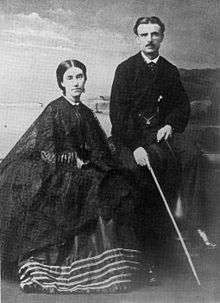Mary Anne Barker
Mary Anne Barker, Lady Barker (29 January 1831 – 6 March 1911), later Mary Anne Broome, Lady Broome, was an author.

Biography
Born Mary Anne Stewart in Spanish Town, Jamaica, she was the eldest daughter of Walter Steward, Island Secretary of Jamaica. She was educated in England, and in 1852 married Captain George Robert Barker of the Royal Artillery, with whom she would have two children. When Barker was knighted for his leadership at the Siege of Lucknow, Mary Anne became "Lady Barker". Eight months later Barker died.
On 21 June 1865, Mary Anne Barker married Frederick Napier Broome.[1] The couple then sailed for New Zealand, leaving her two children in England. The couple's first child was born in Christchurch in February 1866, but died in May. By this time, they had moved to the sheep station Steventon, which Broome had partnered with H. P. Hill to buy. They remained there for three years; they lost more than half their sheep in the winter of 1867, and in response Broome sold out and the couple returned to London.
Both Mary Anne and her husband then became journalists. Still calling herself "Lady Barker", Mary Anne Broome became a correspondent for The Times, and also published two books of verse, Poems from New Zealand (1868) and The Stranger from Seriphos (1869). In 1870, she published her first book Station Life in New Zealand, a collection of her letters home. The book was reasonably successful, going through several editions and being translated into French and German.
Over the next eight years, Lady Barker wrote ten more books, including A Christmas Cake in Four Quarters (1871), a sequel to Station Life entitled Station Amusements in New Zealand (1873), and First Lessons in the Principles of Cooking (1874). This last title led to her being appointed Lady Superintendent of the National Training School of Cooking in South Kensington.
When Frederick Broome was appointed Colonial Secretary of Natal in 1875, Lady Barker accompanied him there. Broome's subsequent colonial appointments had him traveling to Mauritius, Western Australia, Barbados, and Trinidad. Drawing on these experiences, Lady Barker published A Year's Housekeeping in South Africa (1880) and Letters to Guy (1885).
Frederick Broome was knighted on 3 July 1884, and thereafter Mary Anne called herself "Lady Broome". She published the last of her 22 books, Colonial Memories under this name. After Sir Frederick Broome's death in 1896, Lady Broome returned to London, dying there on 6 March 1911.
References
- Hasluck, Alexandra (1969). "Broome, Mary Anne (1831 - 1911)". Australian Dictionary of Biography. Retrieved 7 March 2011.
- Jones, Jenny Robin (2004). "Lady Mary Anne Barker". The Literary Encyclopaedia. Retrieved 21 April 2006.
- Wilson, Phillip John (1966). "BARKER, Lady Mary Anne (afterwards Lady Broome)". Te Ara: An Encyclopaedia of New Zealand. Retrieved 21 April 2006.
- "Barker, Mary Anne". Dictionary of New Zealand Biography. Retrieved 21 April 2006.
- Clarke, Patricia (1988). Pen Portraits: Women Writers and Journalists in Nineteenth Century Australia. North Sydney, NSW: Allen and Unwin Australia. ISBN 0-04-337007-1.
- Hasluck, Alexandra (1957). "Lady Broome". Early Days. V (III).
- Lady Barker (as writer) on Canterbury Library website
- Lady Barker (as pioneer) on Canterbury Library website
- Station Life... & Station Amusements... on Electronic Text Centre website
Works
- Station Life in New Zealand (1883)
- Station Amusements in New Zealand
- Life in South Africa (1877)
- The Bedroom and Boudoir (1878)
Further reading
| Library resources about Mary Anne Barker |
| By Mary Anne Barker |
|---|
- The Seven Lives of Lady Barker: Betty Gilderdale. Publisher: David Bateman, Auckland, New Zrealand, 1996. ISBN 1-86953-289-9 (A full biography)
- The Seven Lives of Lady Barker: Betty Gilderdale. Publisher: Canterbury University Press, Christchurch, New Zrealand, 2009. ISBN 978-1-877257-81-0 (New Edition)
- Station Life in New Zealand: Lady Barker. With an introduction and notes by Betty Gilderdale. Publisher: Vintage, Auckland, New Zrealand, 2000. ISBN 1-86941-423-3
External links

- Works by Mary Anne Barker at Project Gutenberg
- Works by or about Mary Anne Barker at Internet Archive
- Works by Mary Anne Barker at LibriVox (public domain audiobooks)

- Mennell, Philip (1892). . The Dictionary of Australasian Biography. London: Hutchinson & Co – via Wikisource.